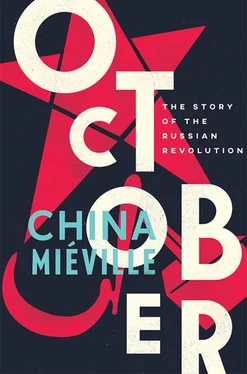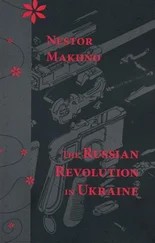Even as they meet, right-wing Mensheviks and SRs in Paris collaborate on the first issue of the pro-war Prizyv . ‘A revolution is brewing in Russia’, the hard-right SR Ilya Fondaminsky writes in its pages, but it ‘will be national rather than international, democratic rather than social, and pro-war rather than pacifist’. Right SR intellectuals gravitate away from a narodnik vision of revolution for agrarian socialism, between liberalism and collectivism, towards a jingoistic version of the bourgeois revolution foreseen by their right-Menshevik collaborators.
United in their opposition to such ‘social patriotism’ of their erstwhile (and in some cases current) comrades, in Zimmerwald the delegates are divided on how sharply to break with them. Eight delegates, including Lenin and his close collaborator and aide-de-camp, the energetic, choleric Grigory Zinoviev, want to leave the corrupted Second International. The Zimmerwald majority, including Mensheviks, will not acquiesce.
Most delegates oppose Lenin’s calls for the revolutionary mobilisation of the proletariat against the war as an attempt to split the International – which it is. Moreover, some present consider that given popular patriotism, Lenin’s call will endanger anyone who makes it. Instead, the meeting reaches a compromise, and produces a statement of general anti-war sentiments. This, for the sake of unity, Lenin and his supporters sign up to, without enthusiasm or satisfaction.
In a short book of 1916, Imperialism: The Highest Stage of Capitalism , Lenin describes the epoch as one of monopoly capitalism entangled with the state, of capital’s parasitism on its colonies. Seeing war as systemic, he opposes any concession to anti-war moderation. Lenin is against moralist pacifism, let alone ‘defencism’, according to which while expansionism is opposed, the ‘defence’ of a home state is deemed legitimate. Instead, famously, he argues for ‘revolutionary defeatism’ – a socialist advocacy of the defeat of one’s ‘own’ side in an imperialist war.
Even the radical Trotsky is alienated by the formulation. He cannot, he says, ‘agree with your opinion… that Russia’s defeat would be a “lesser evil”’. He considers this a ‘connivance’ with patriotism, supporting the ‘enemy’.
One reason his call provokes such consternation is that Lenin is often not clear about whether it is for the defeat of one’s state at the hands of another power , or, along with all imperialist powers, at the hands of the workers. Although the second possibility – international insurrection – is clearly his preference, as well as the telos of his argument, at times he seems to insinuate that the first would suffice. There is an element of performance in the ambiguity. By hammering home this ‘defeatism’, his intention is to bolster the growing sense that the Bolsheviks, more than any other current, oppose the war utterly and without remission.
The war mobilisation drains Russia’s land and industry of workers. Ammunition, equipment, food run short. Inflation soars, with a brutal impact on workers and the urban middle class. The public mood begins to turn. As soon as the summer of 1915, strikes and food riots shake Kostroma, Ivanovo-Vosnessensk, Moscow. The liberal opposition organises into a soi-disant ‘Progressive Bloc’, calling for rights for minorities, an amnesty for political prisoners, certain trade union rights, and so forth. The bloc is furious at incompetence from above, and absolutely opposed to power from below.
The strike wave ebbs, flows and continues, and with it extremes of social desperation. Amid the chaos of the flights of internal refugees, of invaded towns and captured and killed soldiers, thousands of besprizorniki – abandoned, lost or orphaned children – make their way to the cities and gang together in makeshift new families, living in the cracks, by theft, begging, prostitution, whatever they can. Their numbers will explode in later years. An underground of profiteering stirs, of despair, decadence, drunkenness, bohemian ‘cocainomania’. Febrile symptoms of collapse. Moscow is in thrall to a new tango craze, and it undergoes dark mutations: mimes of murder, jaunty references to carnage. One professional dance duo are notorious for their ‘Tango of Death’, performed in traditional evening wear, the man’s face and head painted to become a skull.
A decade before the war, as the tsar and tsarina sought help for their desperately unwell son, they had made the acquaintance of an unkempt, ill-educated, egocentric Siberian ragamuffin, a self-styled holy man who seemed able, by whatever combination of charm, folk knowledge and luck, to alleviate young Alexis’s suffering. Thus Rasputin, the so-called mad monk who is neither mad nor a monk, established himself at the heart of the court – where he remains.
He is a man of rude but substantial charisma. Possibly a member of the Khlysty, one of Russia’s many outlawed sects, he certainly emanates a vatic intensity reminiscent of its practices. He represents himself both as the voice of old, simple, royalist Russia, and as a seer, a prophet, a healer. Nicholas tolerates him; Alexandra adores him.
Rumours swirl about Rasputin’s excesses. He is certainly a drunkard and braggart, and whether or not the many stories of his sexual conquests are true, he enjoys astonishing licence among the nobility, treating his wealthy patrons, especially women, with eroticised discourtesy. He relishes power, and during the war, his power grows. With Alexandra’s support, Rasputin influences governmental patronage according to his whims.
In court circles, even those previously tolerant grow resentful of this upstart muzhik . Hawkers of smut do brisk business in pornographic caricatures of the extravagantly bearded ersatz starets (holy man), up to no good with the tsarina. The tsar brooks no criticism of ‘our friend’, as the tsarina calls Rasputin. She relays his advice to her husband, encouraging him to make military decisions based on Rasputin’s ‘visions’. She gives him Rasputin’s comb to brush through his hair before meeting ministers, so that Rasputin’s wisdom may guide him. He obeys. She sends him crumbs from Rasputin’s bread. He eats them.
Nicholas is already taxing the patience of modernisers by turning his back on the liberals’ milquetoast reform programme. Now, in August 1915, he insists on taking overall command of the army. Though the real decisions are made by the capable General Michael Alexeev, the tsar’s absence leaves considerable power in the hands of the loathed tsarina – which also means those of Rasputin.
With Nicholas’s complicity, Alexandra begins what the ultra-right-wing deputy Vladimir Purishkevich calls ‘ministerial leapfrog’. The Romanovian method becomes one of appointing adventurer after incompetent after nonentity to grand offices of state. The liberals and the sharper-witted right grow ever more apoplectic.
As hatred for Rasputin grows in high society, respect for Nicholas plummets.
It is in this context that Milyukov makes a historic Duma intervention in the Tauride Palace. Breaching all rules of etiquette and discretion, he denigrates, by name, both the tsarina and Boris Stürmer, her latest appointee as prime minister, in a litany of governmental failure. Milyukov punctuates his speech with the repeated question: ‘Is this stupidity or is it treason?’
His words reverberate throughout Russia. He has said nothing that is not known, but he has said it.
It is news to no one by now that ‘the present order of things will have to disappear’. In January 1917, General Alexander Krymov, on leave from the front, meets with Duma deputies in the home of the colourful conservative politician Michael Rodzianko – an Octobrist, a committed monarchist but the implacable enemy of Rasputin – to discuss their discontent. The army, he tells them, would accept, even welcome, a regime change, the replacement of the tsar.
Читать дальше











